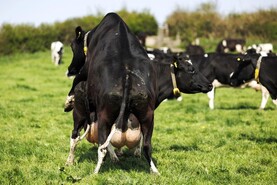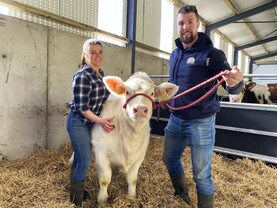The mountainous terrain in the west of Mayo creates many challenges for its sheep farmers. However, as is so often the case, adversity spawns innovation. The Mayo Blackface group is a farmer driven initiative at its very best and has all the hallmarks of innovation.
It has its roots in a conversation that took place between three farmers in 2004. With a growing demand for crossbred breeding stock they realised there was a role for the Mayo Blackface ewe. When crossed to a Blue-Leicester, the mule offspring were desired for their hardiness and versatility. John Joyce, the group’s present chairman, was one of those three original farmers.
He explained: “The three of us said it would be great if we could organise a flagship sale of mountain bred stock. We called a public meeting and from there the group was formed.”
Successes
John said every year since the group has gone from strength to strength as the quality of stock improved. Buyers now come from all over the country for the annual sale and this year 101 buyers purchased 2,000 ewes and lambs giving a 95% clearance rate.
“The system has developed into something of a conveyer belt. On the day the quality stock get the premium price. It certainly bucks the trend for Blackface ewes anywhere else in the country,” John said.
He admitted this was not always the case and that in the beginning there were teething problems. Despite this, farmers continued to buy into the idea and they have seen their returns.
John emphasised that the success has not happened overnight. “It’s down to a few very dedicated people,” he said. “The two women we have in the office, the two Breeges as they’re known, Breege McDonald and Breege Biggins, do all the real graft. Everything goes through them in our dedicated office and without them nothing would happen.”
Challenges
The group, John says, has provided a platform for buyers and sellers in a part of the country that is often forgotten.
“Out and out hill farming is a huge challenge and it will disappear very quickly if no young people can be enticed to keep on the traditions. You cannot learn the knowledge required to run sheep on the hills overnight. It’s learned through the generations from farmer to daughter or son.”
He said support was crucial but blanket schemes would not work as each hill area was incredibly unique. He instead believed locally-led schemes were the way forward.
“Any scheme that is to succeed in the hills will have to be farmer-led. Our group is true knowledge transfer as it is run by farmers, for farmers. We started out with nothing but some innovation and we now have a fully staffed office and have improved our members’ incomes.”
Producer group coordinator
I would co-ordinate the group when it comes to selling our finished lamb. For the last six years we’ve been supplying Kildare Chilling with lambs that are over 14kg carcase weight. The group has been able to provide another route to market for mountain lamb.
This year our members will supply over 23,000 Mayo Blackface lambs. It is well up on last year when we supplied 16,000 lambs but given the weather conditions there has not been as much store lamb sold. Guys have housed lambs and are fattening them instead.
We’ve seen numbers continue to grow over the years as lads are happy with the prices they’re getting for stock. We usually get 10c/kg or more of a bonus.
There is also the ease of it. Guys come to Westport and drop their stock on a Tuesday evening or a Wednesday morning and a lorry brings them to the factory.
Over the last few years there has definitely been an improvement in the quality of the stock. At the start there were some lambs we had to send home but not anymore.
They get to know the type and standard of lamb that is needed.
Teagasc adviser
As a Teagasc adviser I’ve been fortunate and privileged to work with such high calibre farmers in the Mayo Blackface group. It is a win-win for group members and for Teagasc. Group members are improving their incomes through better grassland management, increased output and better knowledge of market requirements.
In 2019, the producer group is focusing on addressing the high cost of concentrates in finishing lambs and the possible alternative crops available to reduce them.
More farmers need to join producer groups as farmers are stronger when they are united. We have 350 members now but we should have 1,000 members. If all lamb in Mayo could be sold through a producer group we would be in a much stronger position. The group has shown initiative and positivity and those involved can take great pride in what they’ve created here.






 This is a subscriber-only article
This is a subscriber-only article









SHARING OPTIONS: